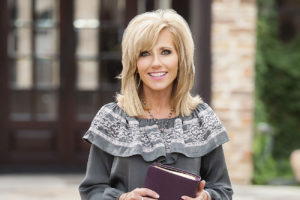GRAPEVINE (BP)—Courage and a recognition of trauma’s long-term effects are called for if the church is to deal sufficiently with its sexual abuse crisis, two well-known evangelical women told a Southern Baptist Convention conference on the subject.
Bible teacher Beth Moore and author Kay Warren—both survivors of childhood sexual abuse —were among the six female speakers who addressed Caring Well: Equipping the Church to Confront the Abuse Crisis.
The Ethics & Religious Liberty Commission sponsored the conference in partnership with the SBC Sexual Abuse Advisory Group to educate churches about abuse prevention and about how to minister to survivors of such abuse.
Crisis demands ‘no small amount of courage’

Followers of Jesus should receive courage from Christ and confront the church abuse crisis, Moore said, because “Christ loved the church; … lives are at stake; families are at stake; the safety of human beings, image bearers (of God) is at stake; … and it is the only path of faithful discipleship.”
“A terrible thing has happened,” Moore told the sold-out audience of more than 1,650 registrants. “The name of God, of the Holy One who dwells in unapproachable light, has been used as a storefront for darkness.”
The casualties include the devastation of victims and their withdrawal from the Christian community, as well as “a very public stumbling block to the gospel,” she said. “What has happened among us broadcasts a message to the unsaved that we are unsafe.
“It will take no small amount of courage to confront the crisis of abuse amidst rampant skepticism. The skepticism is fair, because talk is cheap. We earned distrust, and now we must take the long road of earning trust and walk forward in a posture of humility. It will take much courage not only to resist defensiveness but to resist deflection.
“If we are cowards, the generation coming up behind us will either despise us or be like us.”
No ‘one-size-fits-all recovery process’ for survivors
Warren—who planted Saddleback Church in Southern California with her husband Rick and has advocated for people living with mental illness, HIV/AIDS and the orphans left behind—shared her testimony of the ongoing impact of abuse. A teenage boy sexually abused her in the back of a church auditorium when she was 6 years old, Warren said.
Sign up for our weekly edition and get all our headlines in your inbox on Thursdays
“I wish that I could say today that there is no longer any effects of the abuse,” she said. Christians “like the big bow on top of the package that says, ‘This is the way it used to be, but praise God that’s no longer true and that’s not possible and everything’s been healed and everything’s fine.’ And sometimes it happens that way, but sometimes in this life it doesn’t.”
For Warren, shame and anxiety have been among the effects of her childhood trauma—trauma that has not been fully resolved after years of therapy, she said.
“And I’ve come to believe catastrophic loss represents some not fully grieved trauma or some incompletely grieved losses to trauma in our life,” Warren told the audience. “And survivors find differing measures of healing. It’s not a one-size-fits-all recovery process.”
Warren said she has “come to believe that there are parts of my soul and my body that will not be completely healed until I see Jesus face to face.”
While she has not given up on recovery or the pursuit of healing, she said, “Every day is one day closer to the total and complete healing that my soul longs for, and it’s coming, and it’s mine, and it will be mine forever on that glorious resurrection day.”
Does complementarian theology cause abuse?
Moore offered a response to a question often asked: “Does our complementarian theology cause abuse?” Complementarian theology, as espoused in Southern Baptists’ 2000 Baptist Faith & Message statement, teaches that males and females have complementary—but different—roles, and it restricts the office of pastor to men.
She alone should be held responsible for her answer, Moore said.
“The answer is no,” she told the audience. “Sin and gross selfishness in the human heart cause abuse. Demonic influences cause abuse.”
Yet, Moore said, “a culture prevalent in various circles of the SBC” that came out of complementarianism has contributed to abuse.
“Complementarian theology became such a high core value that it inadvertently by proof of what we have seen—look at the fruit of what happened—became elevated above the safety and well-being of many women,” she said.















We seek to connect God’s story and God’s people around the world. To learn more about God’s story, click here.
Send comments and feedback to Eric Black, our editor. For comments to be published, please specify “letter to the editor.” Maximum length for publication is 300 words.